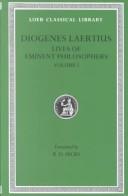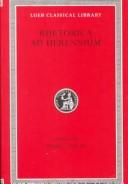| Listing 1 - 10 of 8517 | << page >> |
Sort by
|
Book
ISBN: 2862720216 9782862720210 Year: 1992 Volume: 11 Publisher: Saint-Etienne : Publications de l'Université de Saint-Etienne,
Abstract | Keywords | Export | Availability | Bookmark
 Loading...
Loading...Choose an application
- Reference Manager
- EndNote
- RefWorks (Direct export to RefWorks)

ISBN: 0674992040 0434991856 9780674992030 9780674992047 9780434991853 Year: 2000 Volume: 184-185 Publisher: Cambridge (MA) : Harvard University Press,
Abstract | Keywords | Export | Availability | Bookmark
 Loading...
Loading...Choose an application
- Reference Manager
- EndNote
- RefWorks (Direct export to RefWorks)

ISBN: 0674994442 Year: 2014 Publisher: Cambridge, MA : Harvard University Press,
Abstract | Keywords | Export | Availability | Bookmark
 Loading...
Loading...Choose an application
- Reference Manager
- EndNote
- RefWorks (Direct export to RefWorks)
The Rhetorica ad Herrenium was traditionally attributed to Cicero (106-43 BCE), and reflects, as does Cicero's De Inventione, Hellenistic rhetorical teaching. But most recent editors attribute it to an unknown author.
Book
ISBN: 9781118970928 1118970926 Year: 2020 Publisher: Hoboken, NJ : Wiley-Blackwell,
Abstract | Keywords | Export | Availability | Bookmark
 Loading...
Loading...Choose an application
- Reference Manager
- EndNote
- RefWorks (Direct export to RefWorks)
"In 1970, introducing his Roman Farming, K.D. White justly lamented the lack of attention being paid to Greco-Roman agriculture. Nearly fifty years later, he would presumably be quite pleased with how the field has developed. Beginning in the 1970s (and no doubt in part due to White's own work) there has been steady growth in the number of monographs and articles on aspects of Greek and Roman agriculture as well as new commentaries on, and translations of, the most important ancient texts. Furthermore, instead of a largely text-driven approach, ancient agricultural history now employs an array of archaeological evidence (e.g., botanical and faunal remains) and methodologies (e.g., field survey, isotopic analysis). Students of the agricultural history of ancient Italy, to cite one regional example, now have new editions, translations, and commentaries on the fundamental literary texts (e.g., Goujard 1975 for Cato's De agricultura and Heurgon 1978 on Varro's Res rusticae), monographs edited volumes, and articles putting those writers' works and lives into the broader context of Republican history (e.g., Reay 2005 and many of the chapters in Becker and Terrenato 2012) and literature (e.g., Kronenberg 2009). Archaeologists have published the results of fields surveys, new excavations of rural sites (including exciting recent work on small, non-elite sites by the Roman Peasant Project, Ghisleni et al. 2011), a synthesis of the survey data (Laurano 2011), a catalogue of the villas in central Italy (Marzano 2007), and important overviews (e.g., Forni and Marcone 2002). In the Greek world, archaeological survey in particular has spawned a generation of multidiciplinary studies on the interactions between lanscape and people, between rural and urban (Halstead and Frederick 2000; Adam-Veleni, Poulaki and Tzanavari 2003; Alcock and Cherry 2004; Bresson 2016). What accounts for this astonishing development in what many outsiders probably regard as a fairly dry subject? Undoubtedly one cause is the increased interest in the ancient economy. Since ancient economies were overwhelmingly agricultural, the farming sector demands serious attention. Environmental and demographic research as well as growing interest in foodways have also prompted more work on rural life in antiquity. Efforts to better estimate the population of Roman Italy have led, for example, to interest in the land's carrying capacity and thus more attention to issues of agricultural yields (on modeling Roman production, see Goodchild 2013; for Seleukid Mesopotamia, see Jursa 2010). The need to take stock of all these developments inspired us to develop this Companion which we hope offers an entrée into a field now so rich in research as to be perhaps somewhat intimidating"
Book
ISBN: 1108542719 1108529089 1108423647 1108540015 1108438229 Year: 2019 Publisher: Cambridge : Cambridge University Press,
Abstract | Keywords | Export | Availability | Bookmark
 Loading...
Loading...Choose an application
- Reference Manager
- EndNote
- RefWorks (Direct export to RefWorks)
How did the ancient Greeks and Romans conceptualise order? This book answers that question by analysing the formative concept of kosmos ('order', 'arrangement', 'ornament') in ancient literature, philosophy, science, art, and religion. This concept encouraged the Greeks and Romans to develop theories to explain core aspects of human life, including nature, beauty, society, politics, the individual, and what lies beyond human experience. Hence, Greek kosmos, and its Latin correlate mundus, are subjects of profound reflection by a wide range of important ancient figures, including philosophers (Parmenides, Empedocles, the Pythagoreans, Democritus, Plato, Aristotle, the Stoics, Lucretius, Cicero, Seneca, Plotinus), poets and playwrights (Sophocles, Euripides, Aristophanes, Plautus, Marcus Argentarius, Nonnus), intellectuals (Gorgias, Protagoras, Varro), and religious exegetes (Philo, the Gospel Writers, Paul). By revealing kosmos in its many ancient manifestations, this book asks us to rethink our own sense of 'order', and to reflect on our place within a broader cosmic history.
Book
ISBN: 3030714934 3030714926 Year: 2021 Publisher: Cham, Switzerland : Palgrave Macmillan,
Abstract | Keywords | Export | Availability | Bookmark
 Loading...
Loading...Choose an application
- Reference Manager
- EndNote
- RefWorks (Direct export to RefWorks)
Book
ISBN: 0691194238 Year: 2019 Publisher: Princeton, NJ : Princeton University Press,
Abstract | Keywords | Export | Availability | Bookmark
 Loading...
Loading...Choose an application
- Reference Manager
- EndNote
- RefWorks (Direct export to RefWorks)
A comprehensive look at four of the most famous problems in mathematicsTales of Impossibility recounts the intriguing story of the renowned problems of antiquity, four of the most famous and studied questions in the history of mathematics. First posed by the ancient Greeks, these compass and straightedge problems-squaring the circle, trisecting an angle, doubling the cube, and inscribing regular polygons in a circle-have served as ever-present muses for mathematicians for more than two millennia. David Richeson follows the trail of these problems to show that ultimately their proofs-demonstrating the impossibility of solving them using only a compass and straightedge-depended on and resulted in the growth of mathematics.Richeson investigates how celebrated luminaries, including Euclid, Archimedes, Viète, Descartes, Newton, and Gauss, labored to understand these problems and how many major mathematical discoveries were related to their explorations. Although the problems were based in geometry, their resolutions were not, and had to wait until the nineteenth century, when mathematicians had developed the theory of real and complex numbers, analytic geometry, algebra, and calculus. Pierre Wantzel, a little-known mathematician, and Ferdinand von Lindemann, through his work on pi, finally determined the problems were impossible to solve. Along the way, Richeson provides entertaining anecdotes connected to the problems, such as how the Indiana state legislature passed a bill setting an incorrect value for pi and how Leonardo da Vinci made elegant contributions in his own study of these problems.Taking readers from the classical period to the present, Tales of Impossibility chronicles how four unsolvable problems have captivated mathematical thinking for centuries.
Book
ISBN: 1107477670 9781107062948 9781107656772 110765677X 1107062942 1009302558 Year: 2023 Publisher: Cambridge, United Kingdom ; New York, NY, USA : Cambridge University Press,
Abstract | Keywords | Export | Availability | Bookmark
 Loading...
Loading...Choose an application
- Reference Manager
- EndNote
- RefWorks (Direct export to RefWorks)
This Companion provides a comprehensive guide to ancient logic. The first part charts its chronological development, focussing especially on the Greek tradition, and discusses its two main systems: Aristotle's logic of terms and the Stoic logic of propositions. The second part explores the key concepts at the heart of the ancient logical systems: truth, definition, terms, propositions, syllogisms, demonstrations, modality and fallacy. The systematic discussion of these concepts allows the reader to engage with some specific logical and exegetical issues and to appreciate their transformations across different philosophical traditions. The intersections between logic, mathematics and rhetoric are also explored. The third part of the volume discusses the reception and influence of ancient logic in the history of philosophy and its significance for philosophy in our own times. Comprehensive coverage, chapters by leading international scholars and a critical overview of the recent literature in the field will make this volume essential for students and scholars of ancient logic.
Book
ISBN: 9789042948839 9789042948822 Year: 2022 Publisher: Leuven : Peeters,
Abstract | Keywords | Export | Availability | Bookmark
 Loading...
Loading...Choose an application
- Reference Manager
- EndNote
- RefWorks (Direct export to RefWorks)
The study of magical texts of the Classical, Greco-Roman and Late Antique World has experienced a remarkable impulse since the last decades of the twentieth century until today. The so-called "material turn" in philological studies has promoted an ever-growing interest in the study of the materiality and other non-textual components of ancient documents, which has favored interdisciplinary studies aimed at a holistic approach to ancient texts. From this perspective, the articles collected in this volume offer a series of in-depth case studies of images and other paratextual elements of magical artifacts. Comparative studies, statistical analyses, image-text interconnections, and other analytical possibilities are applied to achieve a greater understanding of the magical objects in question, as well as of the belief system in which they were produced. The book illustrates the importance of iconographic analysis as a fundamental part of understanding Antiquity, its ritual texts, and its magical objec
Book
Year: 1845 Publisher: New York : Harper & Bros.,
Abstract | Keywords | Export | Availability | Bookmark
 Loading...
Loading...Choose an application
- Reference Manager
- EndNote
- RefWorks (Direct export to RefWorks)
"The Treatise on Laws is undoubtedly intended for a really practicable, if not a really existing State. In discussing, however, the primary principles of legislation, the author takes a very wide range, occupying far more time in what he styles the preambles, or recommendatory reasonings about the laws, than in the laws themselves. Hence there are but few points in the Platonic philosophy and ethics, as exhibited in the other dialogues, but what have some representative here. We find the same questions started respecting the nature and origin of virtue--that is, whether the virtues are all so essentially connected that one cannot exist without the others. We find the same views in regard to the end and origin of law--the importance in all things of looking to the idea. There is the same reverence for antiquity and ancient myths' the same disposition to regard religion as the beginning and foundation of every system of civil polity, and the same method of representing the ideas of a God, of his goodness, his providence, of a present and future retribution, as lying at the foundation of all morals and all religion. Even in the departments of psychology and ontology we find many things in The Laws which remind us of the author of the Pheedon, the Parmenides, and the Thesetetus. The favourite doctrines and methods of reasoning contained in the Gorgias are exhibited everywhere; and perhaps there is no other part of Plato's works more in the style and spirit of the Timseus than this very tenth book of The Laws, which we have selected as the ground of our comments in the present work"--Introduction. (PsycINFO Database Record (c) 2009 APA, all rights reserved).
| Listing 1 - 10 of 8517 | << page >> |
Sort by
|

 Search
Search Feedback
Feedback About UniCat
About UniCat  Help
Help News
News